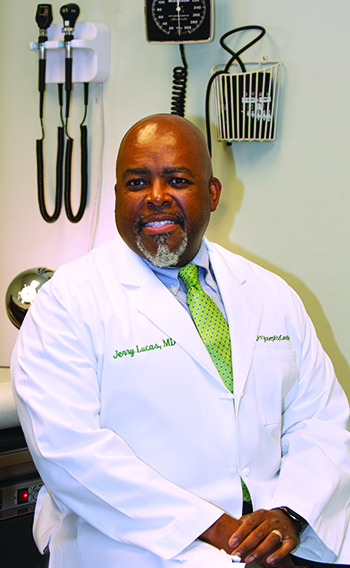What is polycystic ovary syndrome?
Women's Care
Longtime OB/GYN Dr. Jerry Lucas explains this common female reproductive condition and its potential long term side effects
Polycystic ovary syndrome (PCOS) is the most common hormonal and reproductive problem affecting women of childbearing age. It’s estimated as many as 5 million women in the US with PCOS have difficulty getting pregnant.
But it’s a lot more than that. This lifelong health condition causes side effects as early as your middle teens and continues far beyond childbearing years.

Simply put, PCOS is when a woman does not ovulate regularly. Normal ovulation is once every month. Women with PCOS may only ovulate every few months or longer, says Dr. Jerry Lucas, OB/GYN with St. Joseph’s/Candler Physician Network.
In most cases, a young female should have regular menstrual cycles by the age of 16. Females with erratic, irregular periods – skipping months at a time, heavy bleeding, spotting – may have PCOS. Your OB/GYN can diagnose PCOS with a medical history and ultrasound.
On an ultrasound, the doctor will look at the ovaries. Women with PCOS have little cysts that line the outer rim of the ovary, similar looking to a string of pearls, Dr. Lucas describes. That image and the patient’s menstrual history will diagnose PCOS.
What is not PCOS, for example, is if a woman who is 18 or 20 years old, suddenly stops having regular cycles, maybe due to weight gain or stress, Dr. Lucas says. PCOS should only be diagnosed in females who have consistently had irregular periods from the start.
Request an appointment with Dr. Lucas
What causes PCOS?
The exact cause of PCOS is unclear. There is a hereditary component to the condition. It’s not uncommon for sisters or mothers and daughters to have PCOS, but it’s also not a guarantee you’ll get it if your mother has it, Dr. Lucas says. “But it does mean you may have to pay attention, particularly as you start to menstruate, what is the regularity of it?”
What are the side effects, signs of PCOS?
The warning signs of PCOS can be the result of the condition itself. In addition to erratic periods, females with PCOS may experience weight gain, excess hair growth and acne. Because a female is not ovulating regularly, there is a hormone imbalance that can lead to those side effects, Dr. Lucas says.
Additionally, not ovulating regularly can cause insulin resistance. “What that means is their body has to produce more insulin to utilize the sugars that are in their bloodstream,” Dr. Lucas explains. “Insulin resistance may seem like you’re diabetic, but you’re not quite diabetic, but possibly prediabetic. It’s certainly something we look at and follow if you are diagnosed with PCOS.”
That’s because more than half of women with PCOS develop type 2 diabetes by the age of 40, according to the Centers for Disease Control & Prevention. Additionally, women with PCOS are at higher risk of hypertension and thyroid disease. All conditions that you can carry with you throughout your life, even beyond childbearing years.
In most cases, PCOS does not increase your risk of any type of reproductive cancer, Dr. Lucas says.
Nor should PCOS be painful, physically speaking at least. Dr. Lucas says there may be some anxiety and mental pain that comes with the condition, especially in young women. They may feel different or left out. Additionally, PCOS can cause weight gain, which can be mentally stressful at any age, but especially teenage years.
How PCOS affects fertility?
One of the biggest side effects of PCOS is infertility.
“If you have polycystic ovary syndrome, you may only ovulate three times a year whereas somebody without PCOS ovulates 12 times a year,” Dr. Lucas says. “But, you do ovulate three times a year, and if all the stars align, you can get pregnant. It might be a surprise, but it can happen. So it’s important to understand that it’s not that you can’t get pregnant, it’s just far more difficult.”
How do you treat PCOS?
If you have irregular monthly periods, especially after the age of 16, you should see an OB/GYN. While there’s no cure for PCOS, there are treatment options to manage symptoms. There are medicines that can help you have regular monthly cycles (birth control is the most common) and help you ovulate. There are also medicines that can help reduce acne and hair growth.
If you are diagnosed with PCOS, you will want to test and monitor for type 2 diabetes. Making healthy changes to your diet and exercise routine and losing weight can help lower your risk of the disease, as well as other health problems.
If you have PCOS and are having difficulty getting pregnant, Dr. Lucas says there are medications you can take to help regulate hormones and help induce ovulation. If those measures fail, then the help of an infertility specialist may be needed.
“I don’t think polycystic ovary syndrome is anything new; we just didn’t know what to call it,” Dr. Lucas says. “I think it’s always been there, but back in the day, women were told they just can’t have a baby. Now, we have options. We can help people have a better chance for pregnancy.”
If you are looking for an OB/GYN in the Savannah region, Dr. Lucas is accepting new patients. Request an appointment with him now.